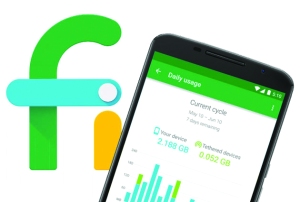Google announced its long-awaited mobile network initiative on Wednesday, Project Fi. Project Fi is being positioned by Google as an alternative to peoples’ existing cell phone carriers, mostly for people who don’t use as much data every month as they pay for. The service will switch you between the Sprint and T-Mobile networks, and Wi-Fi, depending on which one has the best signal in your area. As for pricing, the service will have a $20 base price for unlimited international calls and texts, plus $10 additional for every gigabyte of data you want. The service is only available on the Nexus 6 for now, and those interested can request an invite on Project Fi’s website. Of course, this wouldn’t be news unless Fi brought some truly unique features to the table, which it does.
Google’s biggest hook here is that Project Fi will credit you back the amount of the data that you didn’t use every month. If you pay $30 for 3 gigabytes, for example, and only use 1.5, you’ll be credited back $15 at the end of the month. For heavy data users, this probably won’t make much of a difference. You might even end up paying more on Fi for data if you use more than 10 or 20 gigabytes a month than you would on T-Mobile or Verizon. However, for most mobile data users, getting credited back for unused data is a highly desirable feature, and one that could cause a shakeup in the industry.
Project Fi also promises to switch you to the fastest available Wi-Fi connection if any are available. From Project Fi’s About page: “There are lots of Wi-Fi hotspots out there but not all of them are high-quality. Project Fi automatically connects you to more than a million free, open Wi-Fi hotspots we’ve verified as fast and reliable. This technology helps keep your speed high and your data bill low.” It’s not clear what kind of technology Google is using to verify the speed of hotspots, but this particular feature, though it’s been somewhat understated in Google’s announcement, could cause a big drop in many peoples’ data usage. Google is also promising data encryption over Project Fi, perhaps a bit suspect given their participation in the NSA’s PRISM program.
There are a few other interesting aspects of Project Fi. Customers will be able to use their phone numbers to make calls and texts on all of their devices, similar to Macs’ integration with iPhones, except a connection between phones and other devices won’t be required, only the Hangouts application. There’s also the aforementioned unlimited international calls, and the data customers pay for will be international as well. It’s worth pointing out because major carriers in the US do not currently offer international data or calling on most plans.
All that said, Project Fi’s announcement was disappointing in several respects. $10 per gigabyte of data isn’t competitive at all with the current offerings from other carriers. It’s actually pricier than a lot of what’s already out there. On Cricket, you can pay $50 a month for 5 gigabytes of data ($45 if you enable automatic bill paying). On Project Fi, that same amount would cost $70. Google might justify this by saying that most people won’t actually use all of that, or that you get the added benefit of the best network for your current location, but for those who use all of their data, it’s simply not a great value. Project Fi is actually very similar to what Ting already offers, except additional data with Ting costs $15 per gig rather than $10. It would have been really cool to see Google disrupt the market with lower data costs, but right now that’s not the case.
There’s also the decision to go with Sprint and T-Mobile as carrier partners. It’s easy to understand why they did it; Google has had historic cooperation on various endeavours with Sprint and T-Mobile, such as integrated Google Voice on Sprint in 2011, and T-Mobile’s exclusive launch of Google’s first ever Android devices. However, T-Mobile and Sprint are not known for their exceptional coverage outside of major metropolitan areas. It will be interesting to see whether Fi customers will get good coverage at all in rural areas, given the carriers’ poor track record in coverage there.
Overall, it was a mixed bag of an announcement. For Nexus 6 users who don’t use all of their data, though that demographic is narrow, Project Fi may be worth checking out. Hopefully Google will open the program up to more phones soon after the trial period is over, and we’ll be able to truly see its merits.

hope that comes to canada i pay 90 for 200 mb of data.
Dude that’s crazy